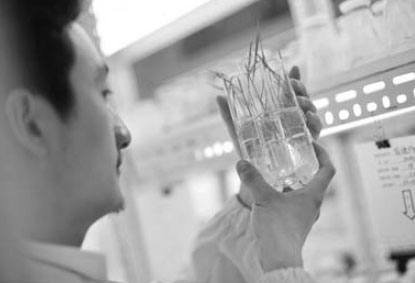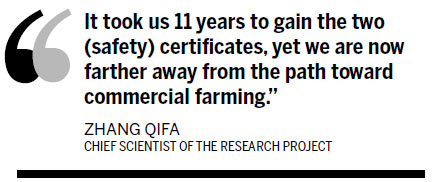As China's only two safety certificates for genetically innovated rice expired in mid-August, scientists voiced concerns over GM rice commercial farming.
It is hard to tell whether the renewal application will be successful, said Yan Jianbing, a professor at Huazhong Agricultural University.
The university developed the two types of GM rice that have yet to get the green light for renewal of their safety certificates.
If the renewal application fails it would be "a heavy blow to scientists' confidence", Yan told the China Science Daily.
If the renewal is rejected it could cool off the interest of investors in GM crops and lead to less investment, he said. With less capital flowing from the private sector, it would be hard to sustain related R&D, which would have to rely on government funds, he added.
According to the related regulations, one year before the safety certificate expiration, filers can apply for an extension. If it has already expired, "it takes at least two years to gain the certificate", Xue Dayuan, an expert at the Ministry of Environmental Protection told China Business Journal.
The Ministry of Agriculture started processing the application for the GM rice safety evaluation in 1999 and issued the certificates, each valid for five years, in 2009.
With the certificates granted, industry observers believed that GM rice commercialization would be within sight.
Yet the progress has "stayed in stagnation in the past five years," Yan said.
Under the current legal framework, gaining a safety certificate is the first step for commercial farming.
Other official documents including a letter of accreditation and licenses for seed production and business are also required.
How to appraise a GM rice variety has yet to be decided.
In essence, GM crops have changed a gene while 99.9 percent of the genome remains the same. Therefore it couldn't be counted as a new variety if it was evaluated in a conventional way. Currently the method for GM rice appraisal is not available, local media cited an anonymous expert as saying.
"It took us 11 years to gain the two (safety) certificates, yet we are now farther away from the path toward commercial farming," said Zhang Qifa, chief scientist of the research project.
"As a high-tech product, GM rice must have its social and economic value as its ultimate goal. Otherwise, the research would be pointless," Professor Yan said.
"Only after the approval of new biological safety certificates and release of GM variety appraisal policies can innovated varieties mushroom in number," he said.
Lin Min, director of the Biotechnology Research Institute at the Chinese Academy of Agricultural Sciences, noted that "without a series of technologies and product lineups launched, GM industrialization will not work."
"Given the marked difference between China and abroad, our scientists need to continue to upgrade technologies and products, or the industrialization cannot be sustained," Lin said.
To date, the Ministry of Agriculture has not named any GM rice as a new variety. Neither has it granted commercial farming or imports of any GM rice. Therefore GM rice or related products on the market are all illegal, the China IP News reported.
Huang Dafang, deputy director of the research institute at CAAS, called for enhanced supervision over GM crop seeds and illegal farming.
GM products should be clearly marked on packaging to enable customers to make choices based on full knowledge, industry observers said.
Currently, clear GM package labeling is not part of the national compulsory standards for GM rice, the IP newspaper said.
wangxin@chinadaily.com.cn
|

A researcher checks GM rice seedlings nurtured at a lab. Shepherd Zhou / for China Daily
|

(China Daily 08/27/2014 page17)


